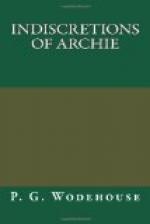“What about Bill?”
“Well, it’s rather awful to think of him tied for life to that-that steam-siren.”
“Oh, we mustn’t look on the jolly old dark side. Perhaps—Hallo, Bill, old top! We were just talking about you.”
“Were you?” said Bill Brewster, in a dispirited voice.
“I take it that you want congratulations, what?”
“I want sympathy!”
“Sympathy?”
“Sympathy! And lots of it! She’s gone!”
“Gone! Who?”
“Spectatia!”
“How do you mean, gone?”
Bill glowered at the tablecloth.
“Gone home. I’ve just seen her off in a cab. She’s gone back to Washington Square to pack. She’s catching the ten o’clock train back to Snake Bite. It was that damned song!” muttered Bill, in a stricken voice. “She says she never realised before she sang it to-night how hollow New York was. She said it suddenly came over her. She says she’s going to give up her career and go back to her mother. What the deuce are you twiddling your fingers for?” he broke off, irritably.
“Sorry, old man. I was just counting.”
“Counting? Counting what?”
“Birds, old thing. Only birds!” said Archie.
CHAPTER XXV
THE WIGMORE VENUS
The morning was so brilliantly fine; the populace popped to and fro in so active and cheery a manner; and everybody appeared to be so absolutely in the pink, that a casual observer of the city of New York would have said that it was one of those happy days. Yet Archie Moffam, as he turned out of the sun-bathed street into the ramshackle building on the third floor of which was the studio belonging to his artist friend, James B. Wheeler, was faintly oppressed with a sort of a kind of feeling that something was wrong. He would not have gone so far as to say that he had the pip—it was more a vague sense of discomfort. And, searching for first causes as he made his way upstairs, he came to the conclusion that the person responsible for this nebulous depression was his wife, Lucille. It seemed to Archie that at breakfast that morning Lucille’s manner had been subtly rummy. Nothing you could put your finger on, still— rummy.
Musing thus, he reached the studio, and found the door open and the room empty. It had the air of a room whose owner has dashed in to fetch his golf-clubs and biffed off, after the casual fashion of the artist temperament, without bothering to close up behind him. And such, indeed, was the case. The studio had seen the last of J. B. Wheeler for that day: but Archie, not realising this and feeling that a chat with Mr. Wheeler, who was a light-hearted bird, was what he needed this morning, sat down to wait. After a few moments, his gaze, straying over the room, encountered a handsomely framed picture, and he went across to take a look at it.




